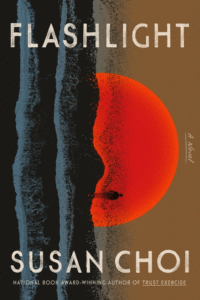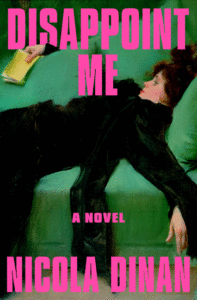
5 Book Reviews You Need to Read This Week
"I felt like I was developing Stockholm syndrome with this novel."
Our flurry of fabulous reviews this week includes Ron Charles on Susan Choi’s Flashlight, Namwali Serpell on Nettie Jones’ Fish Tales, Dan Chaon on Etgar Keret’s Autocorrect, Jeremy Norton on Jordan Thomas’ When It All Burns, and Sharlene Teo on Nicola Dinan’s Disappoint Me.
Brought to you by Book Marks, Lit Hub’s home for book reviews.
*

“With Flashlight, Choi’s appetite turns omnivorous. The claustrophobic atmosphere that made Trust Exercise so intense has exploded. She sweeps across decades and continents, gathering in her hands the cultural upheavals and political machinations of competing nations. That may suggest a sprawling global drama, but in Flashlight, geopolitics are sharpened to a diamond point that crushes one little family.
…
“…like Louisa’s father, we’re swept out to sea to spend the next 450 pages adrift on the waves of time. You simply must submit and pay attention. Choi has no respect for any chronology but her own cryptic order. In these pages, timelines splinter, diverge and finally—trust her—come crashing back together with devastating revelations.
Flashlight is severely allergic to summary, so watch what you read about it. Even categorizing this story as a mystery risks prematurely exposing the novel’s intricate structure to too much light. It’s catholic in its genre, shifting deftly from domestic drama to international thriller, from academic satire to bildungsroman. But what can be safely revealed is that Choi is writing about people who struggle and fail to find a stable sense of identity in a shifting world conspiring against them.
…
“Choi’s storytelling method is calculating but uncompromising—something akin to repeatedly throwing you in the trunk, driving around and dumping you in some strange new place. To survive, get your bearings as best you can on the fly. A hundred pages in, I felt like I was developing Stockholm syndrome with this novel: I couldn’t wait to escape its fierce control and then couldn’t wait to crawl back to it.”
–Ron Charles on Susan Choi’s Flashlight (The Washington Post)

“Nettie Jones scooped every last one of you. Her debut novel, Fish Tales, first published in 1984 and just reissued by Farrar, Straus and Giroux, was far more daring for its time than any of the recent literary trends that have had everyone blushing and gasping and scribbling. It is as sexy as novels by Sally Rooney, as druggy as novels by Tao Lin, as gross as novels by Ottessa Moshfegh, as queer as novels by Garth Greenwell, as violent as Hanya Yanagihara’s A Little Life. In most of these respects, it exceeds even the work of that polymath of outrage, Bret Easton Ellis—and he published his first novel, Less Than Zero, in 1985, a year later…Like her mentor Gayl Jones (no relation), Nettie Jones, now eighty-four, was simply ahead of her time.
…
“Jones made something truly remarkable out of the razing of Lewis to nothing: this is what can happen to a woman when she’s wielding a dangerous freedom, the novel seems to say. Make no mistake, though—this is no trauma plot. There’s no catharsis or healing or triumph over adversity to be found here. There’s no definitive comeuppance, either. Lewis is very much a classic antihero: charismatic, engaging, hilarious, unreliable, unpredictable, unaccountable.
…
“The novel in this way relies both on E.M. Forster’s imperative for fiction—’Only connect’—and on the frisson of the disconnect, which is what allows for those electric jolts to fly across the gaps in Lewis’s story: between words, between events, between versions of a self, and, most radically, between identities. Because, though it’s never stated outright in the novel, it’s obvious to the discerning that Lewis and most of her lovers and friends are black, in all of their phenotypic variety. And, though some of them might hesitate to claim it or name it, all of their relationships with one another are queer.
…
“…praise the muses that Fish Tales has been brought back to life in this one, so we can appreciate just how avant-garde it was. Its voice is as clear and intimate and alive as it must have sounded to its best readers four decades ago. It reminds me of what it feels like when you’re on the phone with someone, and they start telling you their secrets, and you stay up listening late into the night, into the dawn, utterly gripped right until the moment the line disconnects.
–Namwali Serpell on Nettie Jones’ Fish Tales (The New York Review of Books)
“Many people don’t realize that short story collections often take years to complete, so it’s hard for us fiction writers to remain topical when the cultural terra firma is shifting so rapidly beneath our feet. For example, most of the 33 stories in Autocorrect, the most recent book by the celebrated Israeli author Etgar Keret, were written before the Hamas attacks in Israel on Oct. 7, 2023—which, in internet time, is maybe a decade or more ago. It’s a problem, particularly for the satirically inclined. The outrageous things you imagined as dark hypotheticals have come true. Each news cycle requires a suspension of disbelief.
…
“At times, Keret can seem like that hip, cynical Gen X guy who’s down at the end of the bar doling out hot takes about the doomed future of our species. Human extinction features in a number of these tales, delivered with a ‘what did you expect?’ wink. But the targets here (cruel game shows and people lost in virtual reality and A.I. companionship and time-travel conundrums and so forth) feel a bit played out, as though we’ve kind of already seen them in an episode of Black Mirror.
My favorite stories in the collection are the ones that—despite whatever tomfoolery is going on in the global monoculture—focus on the singular strangeness of being a living person in the world. The tense and moving ‘A Dog for a Dog’ features a group of Jewish children questing into an Arab neighborhood to seek revenge for the killing of their dog by a reckless driver—a quietly devastating tale of ethnic resentment and empathy. It’s this story that suffers most from the rapid changes in world history after it was written, though you may feel that the opposite is true, that it lands with the extra heft of real-life tragedy.”
–Dan Chaon on Etgar Keret’s Autocorrect (The New York Times Book Review)
“Jordan Thomas’ When It All Burns is a tremendous book that deepened my understanding and appreciation not just of the men and women who serve as wildland firefighters but also of the long, tragic history of land mismanagement in the American West. Without concerted efforts to reverse our abuse of the land and a dedicated examination of what we have done to create these dire conditions, it shows that all of us will continue to suffer the consequences of megafires.
…
“[Thomas] shares his vivid reflections of the arduous and terrifying work. He delineates the interconnections between not just the climate crisis and the ever-increasing megafires that now destroy more in a season than have burned previously in decades or centuries, but also the history of fire as landscape control and the (spoiler alert!) tawdry and tragic legacy of white supremacy, climate change and corporate greed. The rote explanations—that these fires were caused solely by hapless government agencies, drought or stray sparks—obscured their true form: They were the consequence of centuries of colonial rule and corporate greed.
…
“Thomas is an unlikely addition to the hyper-masculine, hotshot crew, a lithe intellectual with deep lung capacity. He details the deep, complicated bonds of the hotshots, forged in extreme toil and dangerous conditions as well as in the idle hours, waiting or performing tedious labor. He gives us a vivid portrait of those who put themselves between the roaring monster and whatever remains unburned.”
–Jeremy Norton on Jordan Thomas’ When It All Burns: Fighting Fire in a Transformed World (The Star Tribune)
“Disappoint Me is a novel structured around meals, whether assembled distractedly or seasoned with care, and people making strained conversation over birthday barbecues or overpriced small plates in Hackney restaurants. Like her cult debut Bellies, Nicola Dinan’s highly readable and engrossing second novel paints mealtimes as a sociocultural ritual as much as a means of giving characters something to chew on while they reach new understandings or fail to connect. Food and sex, talk and pointed silence, the heart and the stomach are deftly entwined in this deeply contemporary story which explores friendship, queerness, the pacifying allure of couplehood and evolving social mores among millennial Londoners.
…
“As a mixed-race trans woman, Max is used to people making reductive assumptions about her identity. Her prickliness and understandable sensitivity make her a contradictory and complicated protagonist; both dissociative and painfully attuned to those around her, drolly sarcastic yet striving for sincerity and transcendence through writing. A poet who works as the overpaid legal counsel for a tech company, her disillusionment at her job aggravates her longstanding dysphoria and existential malaise. Her voice is acerbic, often hovering between irony and outright melancholy.
…
“Much more than just a love story, Disappoint Me is a refreshingly unsentimental and moving exploration of millennial ennui, prickly friendships and toxic masculinity. It eschews essentialism by depicting modern relationships and the flow of power and secrecy with astuteness and compassion, cementing Dinan as one of the UK’s most perceptive young novelists with her finger firmly on the pulse of contemporary behavior.”
–Sharlene Teo on Nicola Dinan’s Disappoint Me (The Guardian)
Book Marks
Visit Book Marks, Lit Hub's home for book reviews, at https://bookmarks.reviews/ or on social media at @bookmarksreads.























